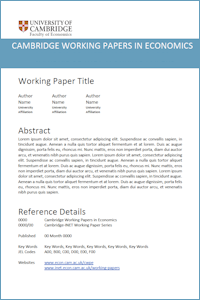
Palma, J. G.
Do nations just get the inequality they deserve? The 'Palma Ratio' re-examined
CWPE1627
Abstract: This paper aims to re-examine inequality in the current era of neo-liberal globalisation, with an emphasis on both highly unequal middle-income countries that have already implemented full-blown economic reforms (like Latin America and South Africa), and on OECD countries (like the US) now intent on replicating the inequality heights of the former. i) How do those middle-income countries end up having such unequal distributional outcomes? ii) Since oligarchies all over the world would gladly reproduce the same conditions, why until recently have only a few been able to get away with this degree of inequality? And iii) Why are there suddenly so many new entrants to the high-inequality club, especially from the OECD? In other words, how did Reagan and Thatcher and the fall of the Berlin Wall trigger a new process of "reverse catching-up", by which now it is the highly-unequal middle-income countries showing the advanced ones the shape of things to come? One might even argue that in the US not only is the 1% catching up with their Latin counterparts (who are used to appropriating between a quarter and a third of overall income), but that new developments such as Trump may be part of the same phenomenon: it is now the South that seems to show the North 'the image of their own future'. And regarding that future, it is tempting to say "welcome to the Third World"! We are all indeed converging in this neo-liberal era but, somehow unexpectedly, this convergence is towards features that so far have characterised a number of middle-income countries - e.g. huge inequalities due to mobile élites creaming off the rewards of economic growth, and 'magic realist' politics (that may lack self-respect but not originality). I also discuss why Piketty's persistence with the neo-classical theory of factor shares - a pretty much obsolete 1950s-style approach to the distribution of income - prevents him from bringing our understanding of current distributive affairs forward as much as he might. His neo-classical analysis not only does not 'fit the facts' (he has to resort to questionable parameters), but also leads him into a methodology and social ontology that assumes that particularly complex and over-determined processes (like the distribution of income) are just the simple sum of their parts. Therefore, their account can be reduced to the algebraic description of individual constituents (e.g., inequality as basically an endogenous outcome of r>g - and that would be all). I also outline an alternative narrative regarding why inequality is becoming so extreme in formerly more enlightened affluent societies. I conclude that in order to understand current distributive dynamics what really matters is to comprehend the forces determining the share of the rich — and in terms of growth, what they choose to do with it!
Keywords: income distribution, inequality, 'Palma Ratio', homogeneous middle, ideology, neoliberalism, 'new left', institutional persistence, Latin America, Chile, South Africa, United States
JEL Codes: D31 E11 E22 E24 E25 I32 J31 N16 N30 N36 O50 P16
Author links: Jose Gabriel Palma
PDF: https://www.econ.cam.ac.uk/research-files/repec/cam/pdf/cwpe1627.pdf 
Open Access Link: https://doi.org/10.17863/CAM.1089
